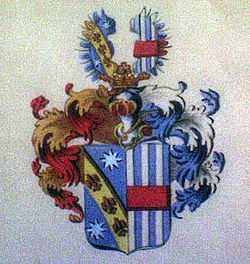Frano Getaldić-Gundulić
| Frano Getaldić-Gundulić | |
|---|---|
 | |
| Born |
August 8, 1833 Dubrovnik, Kingdom of Dalmatia within Austrian Empire (modern Croatia) |
| Died |
July 3, 1899 Dubrovnik, Austria-Hungary (modern Croatia) |
| Pen name | Francesco Ghetaldi-Gondola |
| Occupation | politician |
| Nationality | Ragusan |
Baron Frano Getaldić-Gundulić or Francesco Ghetaldi-Gondola [1] (August 8, 1833 - July 3, 1899) was the first son of Sigismondo Ghetaldi-Gondola and Malvina Uršula de Bosdari. Frano was a member of the Knights of St. John from 1889 until the death of the Mayor of Dubrovnik. He was decorated with the Cross of Devotion (S.M.O) on June 15, 1857. He fought in the Franco-Prussian War (1870–1871). Frano founded the Philatelic Society in Dubrovnik on December 4, 1890.
For other side Baron Gondola, an improving landlord and horticulturist of Lapad, introduced some years ago brussels sprouts, blue cabbage, and other vegetables, later Baron Gondola founded an Agronomy school in Lapad, Gruž. Frano was the first to install in the old city electrical energy to light the streets; and was in 1894 who gave permission for Hotel Imperial ´s construction and thus to begin the policy of promoting tourism, which lasts until today.
The Baron Gondola, was carried along with the International Committee composed for the English ladies Miss Adeline Pauline Irby (*1831 +1911 Sarajevo) and Miss Priscilla Johnston (+1912 England) under M. Wesselitsky, for Herzegovin refugees peoples, the Baron Gondola wrote to the Times magazine, asking for further help for the refugees, his letter appeared on 12 April 1875. More than 150,000 people took refuge in Austro-Hungary in 1875 due to the Herzegovinian rebellion.
In 1889, the Serbian political circle in Dubrovnik supported Baron Frano Getaldić-Gundulić, the candidate of the Autonomist Party (Dalmatians who were pro-Italian), in the 1890 election to the Parliament of Dalmatia, against the candidate of the People's Party (Dalmatians who were pro-Croatian).[2] In the following year during the election of the local government, the Autonomous Party with the Serbian Party won the municipal election in Dubrovnik. Frano Gondola was re-elected as the municipal chief in 1894 after a tumultuous election.[3] He was affiliated with the Serb Catholic movement in 19th-century Dubrovnik, but he himself wrote that he "wasn't Croatian, Serbian or Italian in his ethnic affiliation, rather a Ragusan (Raguseo)".[4] In 1893, he opened the monument for Ivan Gundulić in Gundulić Square during the politically controversial unveiling of the Gundulić monument. Frano lived with his sister Maria in the Villa Gondola. Frano commit suicide in 1899, one day after delivering the account of the treasury of the municipality, the political opponents sabotaged their local government, stolen 10,000 florins of the local treasury. At his funeral Dr. Antun Puljezi said these words:
Dobri oče, diko domovine,
Proste tvoje žrtve svekolike!
Tvoja slava do zvijezda sine,
Tvoje ime s'vjetu je od dike!
Djeco naša, eto vama slike
Poštenjaka, za mlade godine
To je spomen kreposti velike
što narodu nikada ne gine...
Oj, Srpčadi, naša uzdanice,
Evo cv'jeća, smilja i ružice,
Posipljite oko toga groba,
Tu je njega obršila zloba,
Tu Bog gleda nevine zenice,
Uzdižite u paj molitvice...
He was buried in the St. Mihajlo family cemetery in Lapad (in the Gruž district).

See also
- House of Gundulić
- Republic of Ragusa
References
- ↑
- ↑ Jan Lewandowski (1996). Trudna tożsamość: problemy narodowościowe i religijne w Europie Środkowo-Wschodniej w XIX i XX wieku. Instytut Europy Środkowo-Wschodnej. ISBN 83-85854-17-7.
- ↑ Jelić, Lidija. "O jednom zanimljivom nalazu u Biblioteci SANU ili jedno moguće čitanje plakata" (PDF) (in Serbian). Serbian Academy of Sciences and Arts. Retrieved 2012-03-27.
|chapter=ignored (help) - ↑ Croatian Academy of Sciences and Arts (2004). Anali Zavoda za povijesne znanosti Hrvatske akademije znanosti i umjetnosti u Dubrovniku. Dubrovnik. Retrieved 2010-11-23.
External links
- Turks and Christians: A Solution of the Eastern Question, James Lewis Farley
- Dubrovačke slike i prilike, 1800–1880, Josip Bersa
- Gospar Ivo, Mirko Žeželj.
- Dalmatinski sabor, 1861.-1912. (1918.) god, Ivo Perič.
- Politicka misao Frana Supila, Ivo Petrinovic.
- Hrvatski narodni preporod u Splitu: u povodu stogodišnjice ponarođenja splitske općine 1882, Duško Kečkemet.
- Razvitak turizma u Dubrovniku i okolici od pojave parobrodarstva do 1945. godine, Ivo Perić